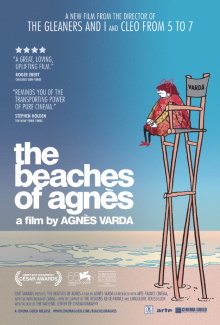
Faces Places turned out to be Agnès Varda’s last film but she herself thought that this one, made ten years earlier, would have been it. This is a documentary as well and despite being highly stylistic, serves as a sort of autobiography of her own life. She recreates scenes from out of her memories and intersperses it with scenes from her own films and those of her husband Jacques Demy.
The film opens with Varda mysteriously asking her production staff to carry mirrors and pieces of furniture onto the beach in Belgium. She explains that she has always loved beaches and this is where she grew up. Setting up her mirrors just so and even searching out a wardrobe with a creaky door that sounds just like the one she used to have at home, she recreates this and similar scenes from her memories as she invites viewers on a tour of her life. In chronological order, she speaks of growing up, her interest in photography and how that turned to filmmaking, her friends, meeting her husband Demy, her film and art projects and much more. As her friends include such luminaries as Jean-Luc Godard, Alain Resnais and Jim Morrison, this makes for quite a who’s who of 1950s and 1960s. Peppered throughout are also clips from her own films and those of Demy which will be a delight to fans of their work as she recounts anecdotes and details from behind the scenes.
Not that I’ve watched many of them, but I believe this may well be the most creative and artistic autobiography I’ve ever seen. If someone had just told me about them, I’d have dismissed stuff like placing mirrors on the beach or Varda walking backwards in camera to represent travelling through time as gimmy affectations. But she has a way of making it all work and silly as it seems, laying down sand right on the street and turning it into a recreation of her old production company does work at evoking some of the chaotic bustle that must have prevailed at the time. She even gets someone to act as a younger version of herself and dresses modern people in the clothes of the appropriate era. One of my favorite recreations is little girls wearing school uniforms singing Maréchal, nous voilà! during Vichy France. It’s such a fantastic way of giving audiences a tiny taste of everything that she has lived through.
One issue is that Varda talks about many, many people in this film. While the strong feelings that she holds for all of them shine through and many of them are minor celebrities in their own right, there are so many figures that you kind of lose track of them after a while, becoming a procession of artistic figures all of whom Varda gushes praise on for being creative and brilliant. In fact, she never says anything bad about anyone ever in this film. I think it says something about the kind of personality she had, genuinely seeming to think the best of everyone and everything. As others have pointed out, she seems to perfectly embody the French joie de vivre.
In any case, I’m much more of a Demy fan than a Varda fan so I appreciated every bit of detail in here about Demy. I also found it fascinating that the two worked on their respective film projects separately from each other despite living together. But for the most part, I enjoyed the form of this film and the endless ways that Varda came up with to present her life than her actual answers and commentaries. It is a pretty great documentary though it would be pointless to watch this without having at least some familiarity with the work of Varda and Demy.